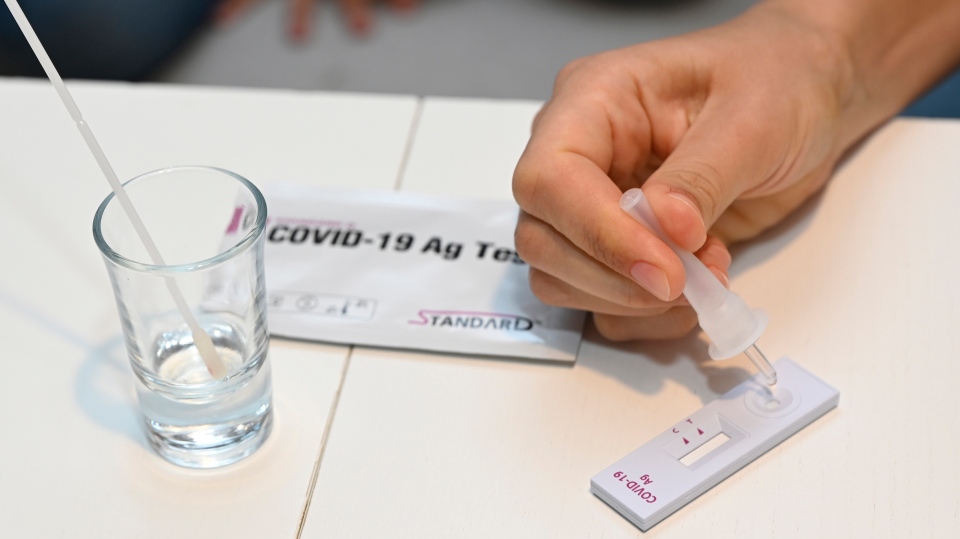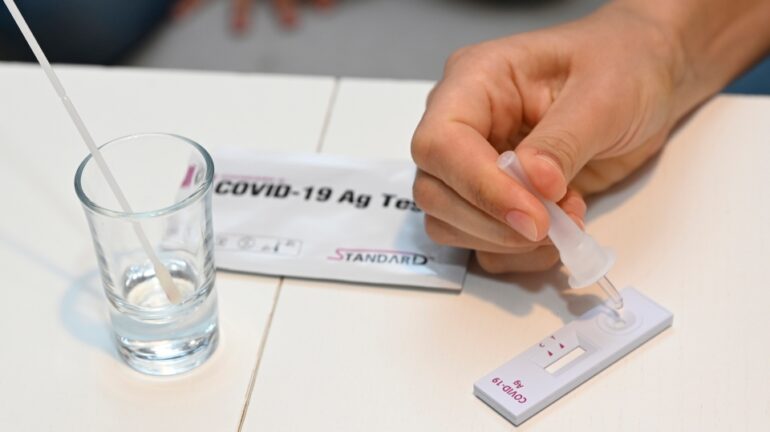- Your cart is empty
- Continue Shopping
Confirming all COVID-19 positive rapid tests with PCR may not be practical, doctor says

As certain provinces experience backlogs in administering and processing COVID-19 lab tests, one doctor says confirming a rapid test result with PCR may not be practical in all situations.
Dr. Marek Smieja, an infectious disease specialist and professor at McMaster University in Hamilton, Ont., spoke to CTV News on Wednesday about COVID-19 testing, saying it “may not be practical” to confirm some positive rapid tests, particularly for those who have had limited contacts and no symptoms.
While it is ideal to follow a positive rapid test result with a lab-based polymerase chain reaction test, commonly known as a PCR test, he says it would depend on how much individual risk is involved, and what the risk would be to public health.

Tracking every case of COVID-19 in Canada
Tracking variants of the novel coronavirus in Canada
Cases, deaths and hospitalizations: Comparing Canada’s two years of COVID-19
Confirming all COVID-19 positive rapid tests with PCR may not be practical, doctor says
Several provinces considering allowing COVID-19 positive health workers to stay on job
Two shots of Pfizer vaccine 70 per cent effective against Omicron variant, research shows
Do you have a cold, the flu or COVID-19? Experts explain how to tell the difference
WHO chief worried about ‘tsunami’ of Omicron, Delta cases
New COVID-19 cases in U.S. soar to highest levels on record
Some provinces face COVID-19 PCR testing backlogs amid Omicron surge
How long can you spread Omicron?
Alpha variant evolved to suppress the immune system and Omicron shares a similar mutation: study
Scientists identify antibodies that can neutralize Omicron variant
Full coverage at CTVNews.ca/Coronavirus
“By that, I mean if it’s a child who’s going to stay home for 10 days, I think that it may be acceptable not to confirm those by PCR,” Smieja told CTV’s Your Morning.
Children are much less likely to develop severe illness from COVID-19 compared to adults, and if a child does receive a positive rapid test but doesn’t feel overly sick, Smieja explained in a telephone interview with CTVNews.ca that there is little risk involved forgoing the PCR.
However, if that same child is so ill they need to go to the emergency room, then a PCR test would be needed to confirm it is due to COVID-19.
In another instance, a person in their 70s may want to confirm a positive rapid test with PCR, given that age group is at a higher risk of severe illness and hospitalization due to COVID-19, Smieja said.
Meanwhile, on the public health side, using PCR over antigen tests alone would be important for hospital investigations and potential outbreaks, which he says antigen tests alone won’t fully capture.
“If it’s a hospital outbreak where antigen is the initial positive, I absolutely need to see that confirmed before I’m going to swab a lot of staff and patients on that ward,” Smieja said on CTV’s Your Morning.
In those cases, PCR would be relied upon in order to fully understand the extent of an exposure, and in turn protect the group involved and the public at-large, he said. This could apply to high-risk settings such as hospitals, congregate settings and long-term care homes, as well as occupational settings.
And while children may not get as sick from COVID-19, confirming an antigen test with PCR would become much more important for someone such as a teacher with a medical condition, Smieja said.
A surge in demand has led to long lineups at testing centres in certain provinces, as well as difficulties trying to find a timely appointment as cases of COVID-19 increase sharply amid the spread of the new Omicron variant.
The variant is believed to be more transmissible and may evade some vaccine protection compared to its predecessor, Delta. At the same time, some evidence suggests that severe illness and hospitalization may be less likely with Omicron, although those who are unvaccinated are still considered to be at greater risk from infection.
Provinces and territories did ramp up distributions of COVID-19 rapid tests ahead of the holidays.
But in Ontario, for example, anyone who tests positive with a rapid test must get a follow-up lab-based PCR test, or a rapid point-of-care molecular test, within 48 hours to confirm the result.
In response to the high demand for PCR tests, some provinces have limited testing to those who have symptoms or may be at higher risk of severe illness.
Dr. Dale Kalina, an infectious disease specialist at Joseph Brant Hospital in Burlington, Ont., told CTV News Channel on Wednesday that rapid tests can be helpful if someone is unable to access a PCR test.
He says one way to make a rapid test more sensitive, and increase the likelihood of picking up COVID-19, is to swab the back of the throat first, followed by both nostrils.
“But we still do need to be able to use some of those PCR tests to be able to log that into the system right now, and be able to plan if we do need to hospitalize you or give you treatments, for instance,” Kalina added.
Quebec is allowing some health-care workers, who have tested positive for COVID-19, to stay on the job under certain conditions in order to preserve operations.
Meanwhile, the U.S. Centers for Disease Control and Prevention has released new guidance reducing the amount of time an infected person, vaccinated or not, should isolate to five days from 10 previously. After the five days, those without symptoms can return to normal activities as long as they wear a mask everywhere for at least five more days. Those still with symptoms are advised to isolate until they feel better and then start their five days of mask-wearing at all times.
“Most people who have been fully vaccinated have very low levels after about five to seven days, so I think that the risk is very low, but we don’t have a lot of really good data, so I think the CDC guidelines have caused some alarm,” Smieja said.









